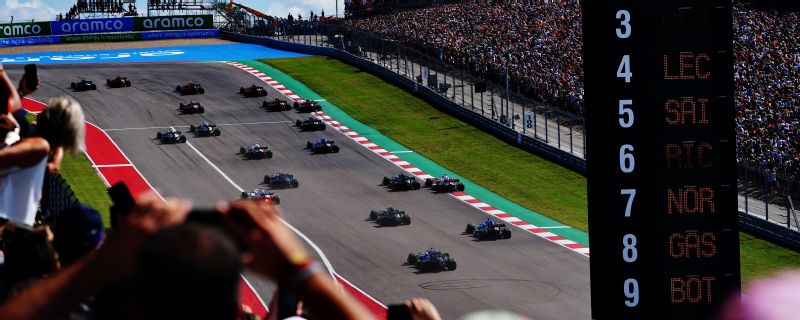Austin remains F1’s home in the U.S.

Nate Saunders tallies up the successes and failures from the FIA in recent years. (1:29)
With glitzy new races in Miami and Las Vegas, it would be easy to forget or overlook just how important Austin’s Circuit of the Americas (COTA) has been for Formula One’s push to be relevant in the United States.
Last year’s carnival-like event at COTA was confirmation of the extent F1 has cracked America in recent years, with drivers and team bosses all commenting how big it felt compared to previous visits to the States. COTA looks set to raise the bar higher this year, with a record 440,000 fans expected in the days leading up to and including Sunday’s U.S. Grand Prix (live on ABC, 3PM ET).
“This year’s the best yet,” circuit boss Bobby Epstein told ESPN. “We sold out almost immediately.”
Much has been written about the surge of interest F1 is enjoying right now, helped massively by Netflix’s Drive to Survive series. It’s showing no sign of easing off — Miami’s debut race in May generated huge fanfare and the Saturday night Las Vegas street race slated for Nov. 18 next year already looks set to be one of the highlights of the 2023 season.
F1 holding three races in America seemed unthinkable only a handful of years ago. COTA, built specifically for F1, arrived in 2012 after several years without a race in the States and when interest in the sport was low, following the infamous and controversial tenure racing at Indianapolis between 2000 and 2007. It has become a mainstay on the calendar since and recently had its contract extended to 2026.
While the return to the Austin venue this year doesn’t match the hype and excitement generated recently by Miami and Vegas — perhaps in part because Max Verstappen wrapped up the title two weeks ago — those two events are still enjoying the novelty factor.
Epstein thinks COTA played a key role in making sure there was an established race in America when the boom period started.
“We’re really proud of what we’ve accomplished and how the fans have recognised the efforts here. The sport was in Indy for a bit, but realistically that’s for the Indy 500 and IndyCar, that’s their home stadium.
“We built this place for Formula One. We gave it its first home in the States, certainly the first in this century or in the last 30, 40 years. I hope it led to a lot of the success that’s happened.
“I don’t think it would have been here… I don’t think anyone else would have built a purpose built facility for F1. There was talk of maybe there wasn’t anyone else crazy enough to do it!”
COTA knows all about the novelty of being a new U.S. race. Once the early buzz had worn off for the Austin circuit, it initially struggled to establish a foothold in the mid-2010s as the realities of financing a modern F1 race hit home. During some of those more uncertain times, Epstein sometimes voiced his concern at hosting a race seven days before or after the Mexican Grand Prix for fears of that event hurting ticket sales.
Those fears are gone now. Epstein says he’s as excited as anyone to see the Vegas race, set to be held on a Saturday evening three weeks after Austin’s 2023 event.
“I think it’s great. It’s going to be so unique,” Epstein said. “It’s nice to be able to differentiate between the events. The show that Vegas is, it’s the lights and the fun. That’s great.
“And we’re proud to be the United States Grand Prix – we’re proud of that, we own that. There’s a whole package here that’s unique. It will be around a long time. And then there’s the fun of Las Vegas, it’s going to be a great show, it happens in the evening – but it’s very different to what we’re doing here.”
Fans attending the Austin race can expect an event which mixes F1 race and support events with a festival. Ed Sheeran and Green Day are headlining the musical slate of events at COTA this week, while the circuit has added a new grandstand on the infield of the high-speed Turn 6. An American driver, Logan Sargeant, will take part on Friday practice for Williams.
As was the case last year, COTA expects a large percentage of fans attending will be people who only properly discovered F1 in the last few years.
When asked when or if the buzz around F1 will ease off, Epstein said: “I don’t think there’s a cap [on F1’s popularity]. I think there’s a trajectory of growth that will perhaps slow, but it’s still going to be growth.
“It’s got the momentum it needs to keep growing. It’s reaching a demographic a lot of sports would envy and that a lot of sponsors crave. A lot of people are becoming fans for life, including a lot of much younger fans who will be around for a while.”
The addition of Vegas and the seemingly unstoppable rise of F1’s profile Stateside has started speculation of a fourth races joining the existing trio in a few years, but Epstein thinks that is premature.
“It might be possible. The F1 model is built on ‘what can we earn from a race?’ Shareholders want to know you’re making great profit. That probably prohibits a lot more U.S. races, it’s very expensive to put one on, very expensive to build a track, and you’ve got a lot of money bidding from other places, like in the Middle East.
“I think it’s too early to say four. Let’s get these three on solid ground first.”